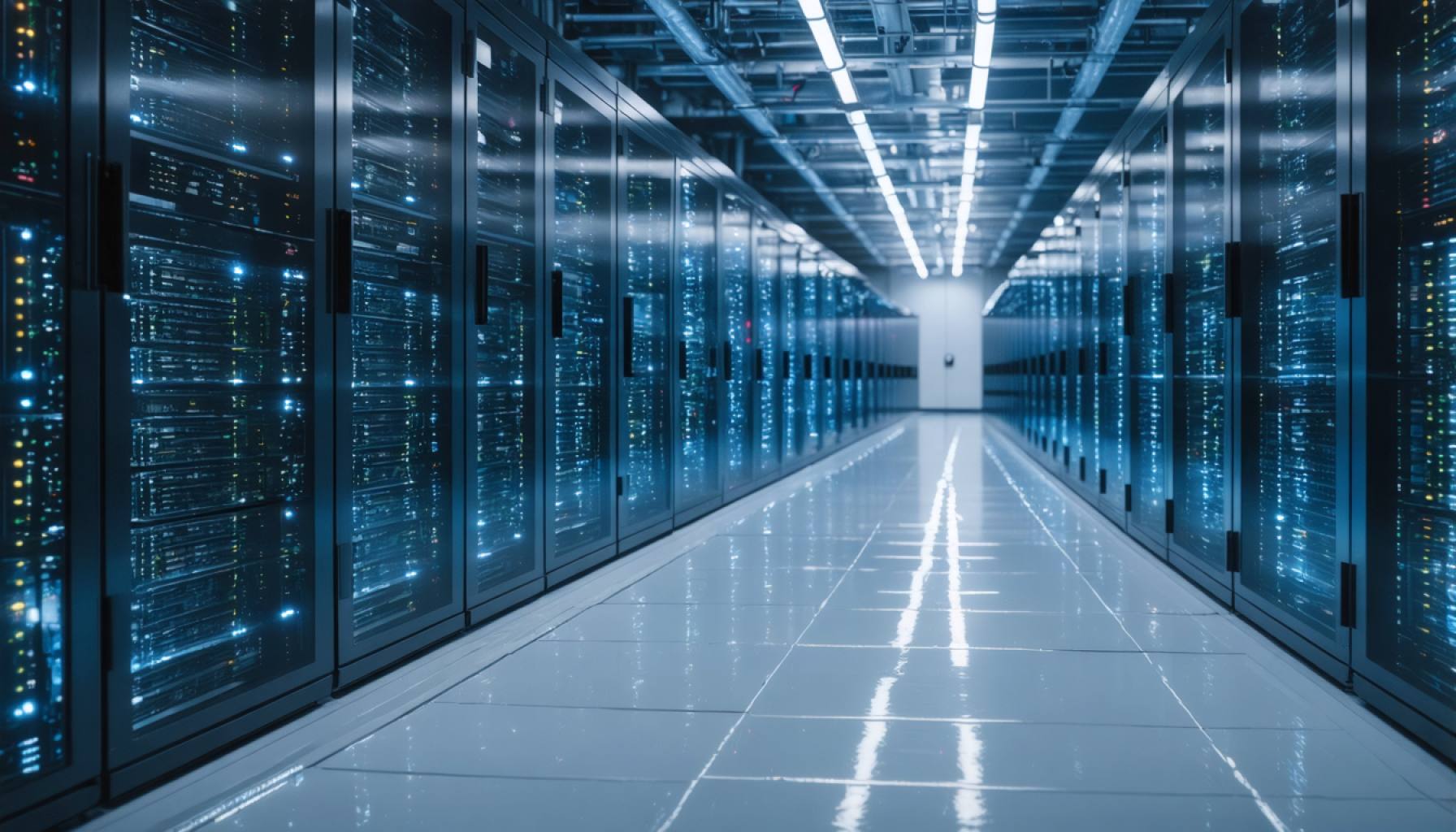- Orbital Materials, led by a former DeepMind researcher, aims to transform data centers into carbon capture pioneers using AI.
- The company developed a novel AI-designed molecule capable of capturing CO2 in the high-heat environments of data centers, outperforming traditional methods.
- Orbital’s technology is modular and scalable, housed in portable shipping containers to fit various data center needs.
- This innovation positions data centers as potential nodes in a global carbon removal network, turning environmental liabilities into assets.
- Challenges include proving scalability and handling logistics like cost and carbon storage, yet the approach marks a significant step in tech-environmental synergy.
- Orbital demonstrates how AI can address climate challenges, transforming the ecological footprint of digital infrastructure and inspiring sustainable technology practices.
A quiet revolution is unfolding in the shadows of the digital world, where data centers—vast hubs of blinking lights and humming servers—are taking on an unlikely new role: carbon capture pioneers. The mastermind behind this transformation is Orbital Materials, a company born from the cutting-edge mind of a former DeepMind researcher. Their mission? To harness the power of artificial intelligence and radically alter the carbon footprint of our digital infrastructure.
Orbital Materials is not your average tech startup. Their unique approach targets the very heartbeat of modern computing—the data centers that process, store, and transmit the vast streams of information that drive our digital society. Despite their essential role, these data centers demand immense energy, and as a consequence, contribute significantly to carbon emissions. But what if these power-hungry giants could become part of the climate solution?
The secret weapon in Orbital’s arsenal is a novel, AI-designed molecule, a distinctive purple powder, capable of capturing carbon dioxide in the sweltering heat that data centers typically produce. Conventional carbon capture methods falter in such conditions, often needing cold temperatures to operate effectively. However, Orbital’s innovation not only withstands the heat but thrives in it, suggesting an elegant solution to a previously insurmountable problem.
What sets this company apart is not just its groundbreaking material but also the way it plans to deploy it. Encasing their systems in portable shipping containers, Orbital can easily adapt and scale their technology across various data centers—a model as flexible as it is impactful. In practical terms, this means that any data center could potentially become a node in a vast, global network of carbon removal, turning a liability into an asset in the fight against climate change.
Yet, challenges remain. The fledgling system’s ability to perform at scale is yet to be conclusively proven, and real-world applications will require addressing logistical hurdles like cost and storage of captured carbon. Despite these obstacles, Orbital’s ambition highlights an exhilarating chapter in the intersection of technology and environmental science.
As the tech world grapples with its environmental responsibilities, Orbital’s vision offers a tantalizing glimpse into how AI can be an ally in addressing one of humanity’s greatest challenges. By transforming the ecological footprint of data centers, they stand as a beacon of hope and ingenuity. If their model succeeds, they won’t just capture carbon—they might capture imaginations, inspiring a new era where technological prowess and environmental stewardship walk hand in hand.
Can Data Centers Become the Unsung Heroes of Carbon Capture?
The Role of Data Centers in the Fight Against Climate Change
Data centers, essential to our digital world, face criticism for their energy consumption and subsequent carbon emissions. Understanding their ecological impact requires grasping the basics:
– Energy Consumption: Data centers account for about 1% of global energy use, a figure expected to grow as digital infrastructure expands. However, The International Energy Agency reports that improving energy efficiency could significantly mitigate this impact.
– Carbon Emissions: Energy consumption in data centers contributes to carbon emissions, exacerbating climate change. The Uptime Institute’s 2021 survey estimated that less than 50% of data centers were tracking their carbon emissions, highlighting the potential for increased accountability.
Orbital Materials’ Breakthrough: A New Model for Carbon Capture
Orbital Materials introduces a pioneering AI-designed molecule capable of capturing carbon dioxide at high temperatures, a feat that traditional methods struggle to achieve. Here’s how it works:
1. High-Temperature Resilience: Conventional carbon-capture technologies prefer cooler temperatures. Orbital’s purple powder, by contrast, operates effectively in the warmth of data centers, making it uniquely suited for this environment.
2. Scalable Deployment: The portable, shipping container model allows flexibility and scalability, enabling data centers worldwide to become carbon capture hubs.
3. Challenges: Despite its promise, Orbital must tackle scaling issues, logistical concerns, and the cost of carbon storage.
Real-World Use Cases and Industry Potential
The implications of Orbital’s innovation extend beyond data centers:
– Real-World Application: By turning data centers into carbon capture points, tech companies can enhance their sustainability profiles, contributing to global climate goals.
– Market Trends: The global carbon capture and storage market is projected to reach $6.13 billion by 2027, according to Fortune Business Insights. Innovations like Orbital’s could play a pivotal role.
Pros and Cons Overview
Pros:
– Reduces carbon emissions from data centers.
– Could accelerate adoption due to scalability.
– Promotes corporate sustainability efforts.
Cons:
– Uncertainty around full-scale effectiveness.
– High initial investment costs.
– Need for effective carbon storage solutions.
Actionable Recommendations
For companies and stakeholders looking to integrate such innovations:
– Invest in Pilot Projects: Start with small-scale implementations to assess effectiveness.
– Collaborate with Innovators: Partner with companies like Orbital to stay on the cutting edge of carbon capture technology.
– Track Carbon Metrics: Implement robust tracking of carbon emissions to measure impact accurately.
Given these insights, data centers have the potential to transform from digital powerhouses into environmental champions. They can lead the way toward a more sustainable future by embracing advanced technologies like Orbital’s carbon capture innovation.
For more insights on technological advancements and their impact on sustainability, explore Orbital Materials. Their work also stands as a testament to how AI and environmental stewardship can form a productive alliance.



















